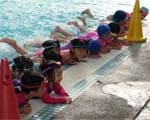Children who start swimming before the age of 2 may be at increased risk of a common infant lung infection i.e. bronchiolitis, and possibly asthma and respiratory allergies later in life.

Bronchiolitis is an infection of the lungs' small airways, usually caused by the respiratory syncytial virus that is common in infants.
To assess the influence of swimming in chlorinated pools on the risks of bronchiolitis, researchers from Belgium and Italy examined 430 children (including 47% girls) of nursery schools. The parents were asked to complete questionnaires about the child's health history and swimming practice.
It was found that infant swimming (whether in indoor or outdoor pools) was linked to an increased risk of bronchiolitis. Thirty-six percent of the children exposed to chlorinated indoor or outdoor pools before age 2 years had a history of bronchiolitis, compared with 24 percent of their peers. Among children who had used only indoor pools for more than 20 hours before age 2 years, the risk of bronchiolitis was 4-times higher compared with children who had never been to a chlorinated indoor pool at that age. Meanwhile, children who had spent that much time at an outdoor pool showed a two-fold increase in their risk of the lung infection.
Overall, there were no significant differences in the rates of asthma and allergies among infant swimmers and their peers. But when the researchers looked at children with a history of bronchiolitis, only those who had been infant swimmers showed increased risks of asthma and respiratory allergies.
Among infant swimmers who had contracted the infection, 15 percent later developed asthma that compared with 4 percent of swimmers with no history of bronchiolitis. The figures were nearly the same when it came to hay fever.
The researchers attributed the above findings to the inappropriate air quality around pools, particularly indoor ones. When the chlorine (used to disinfect pools) combines with swimmers' sweat, saliva or urine, irritating chlorine byproducts are formed, and over time these chemicals may damage the airways.
The above findings further add to the evidence that exposure to chlorinated pools may affect children's respiratory health - particularly if they have a family history of asthma or respiratory allergies like hay fever.
DoctorNDTV is the one stop site for all your health needs providing the most credible health information, health news and tips with expert advice on healthy living, diet plans, informative videos etc. You can get the most relevant and accurate info you need about health problems like diabetes, cancer, pregnancy, HIV and AIDS, weight loss and many other lifestyle diseases. We have a panel of over 350 experts who help us develop content by giving their valuable inputs and bringing to us the latest in the world of healthcare.












